
Dickensian diseases such as scabies, scurvy and syphilis are making a comeback in modern Britain.
Britain is currently experiencing an outbreak of the highly contagious scabies disease and the British Association of Dermatologists has issued a warning about the ‘unusually high’ figures.
The condition, caused by microscopic mites that burrow into the skin, causes intense itching – and spreads easily when people come into close contact.
Some 3,689 cases were diagnosed in hospitals in England over the year to April – up from 2,128 the year before, according to NHS figures.
Data from GP practices also shows there has been a spike in recent weeks, which may be nice for students returning to university.
But a slew of diseases that were widespread in the Victorian era are spreading, with malnutrition, a drop in MMR vaccination rates and a drop in public health funding blamed for the rise.
Doctors warned in the BMJ that there is a resurgence of scurvy because people are not eating enough fruit and vegetables. The times reported.
In 2022, there were more than 800,000 admissions in England and Wales with conditions related to poor nutrition, including ‘Victorian’ diseases, scurvy and rickets.
Some 3,689 cases of scabies were diagnosed in hospitals in England over the year to April, according to NHS figures.

The statistics also showed that 171 people were treated for scurvy and 482 for rickets, with 405 of these patients being children.
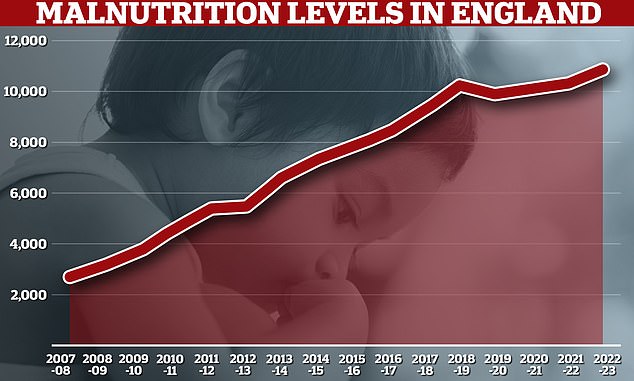
A Freedom of Information request from the Times Health Commission shows that 10,896 NHS patients in England were admitted to hospital with malnutrition in the year to April 2023. In 2007/2008 there were only about 2,700 hospital admissions due to malnutrition, rising to 5,500 in 2012/2013.
Nearly 11,000 people in England – including hundreds of children – were admitted to hospital with malnutrition in 2022.
Data from NHS England shows that the number of admissions due to the serious condition has quadrupled in the past 15 years and doubled in 10 years.
Although there has been a resurgence in the past decade, doctors have claimed that ‘we will eventually be dealing with more of these Victorian-era diseases’ due to the cost of living crisis.
Struggling Brits have been forced to cut back on fruit and vegetables and eat cheaper junk food, which lacks essential vitamins and minerals.
A Freedom of Information request from the Times Health Commission last year revealed that 10,896 NHS patients in England had been admitted to hospital with malnutrition in the year to April 2023.
Malnutrition occurs when a diet does not provide the right amount of nutrients, with unintentional weight loss, low body weight and feeling tired and weak being the main symptoms.
The statistics also showed that 171 people were treated for scurvy and 482 for rickets, with 405 of these patients being children.
Scurvy is caused by not consuming enough vitamin C, which is found in citrus fruits, broccoli and potatoes. Typical symptoms include a feeling of fatigue, weakness and irritability, severe joint or leg pain and swollen and bleeding gums.
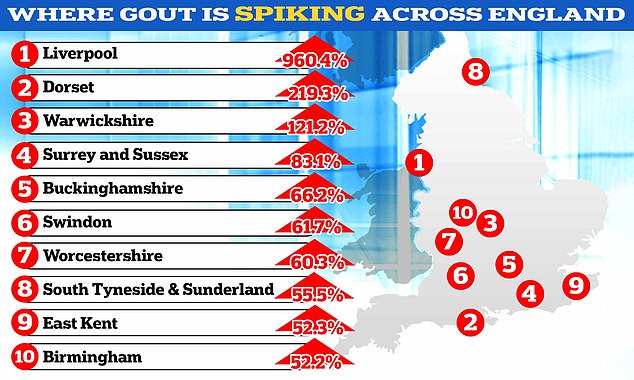
Data obtained through Freedom of Information laws shows Liverpool University Hospitals NHS Foundation Trust recorded 5,864 cases of gout in 2023
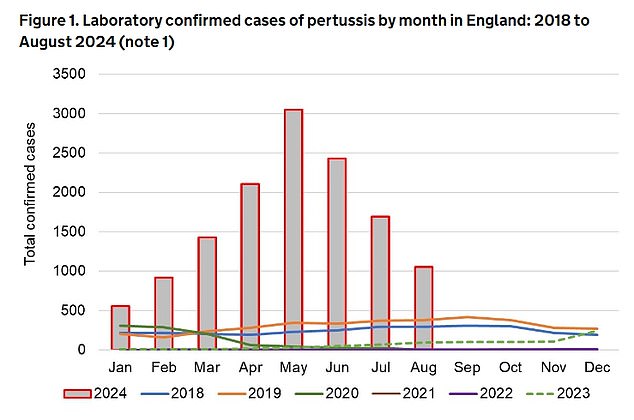
Ten babies died from whooping cough in England this year and there have been more than 12,000 cases, compared to just 856 last year (Government data graph)
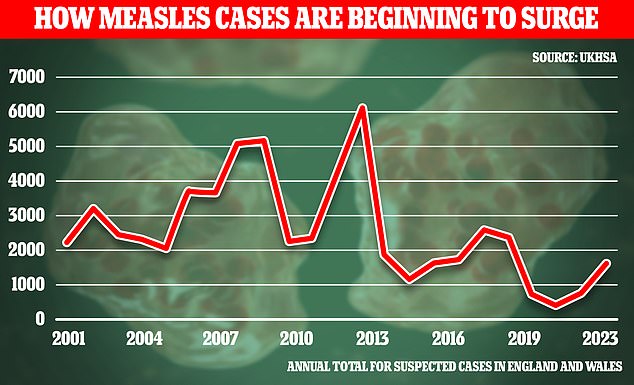
The latest data from the UK Health Security Agency (UKHSA) shows that there were 1,603 suspected cases of measles in England and Wales in 2023. This figure is more than double the 735 in 2022 and an almost fivefold increase compared to the 360 reported cases. in 2021
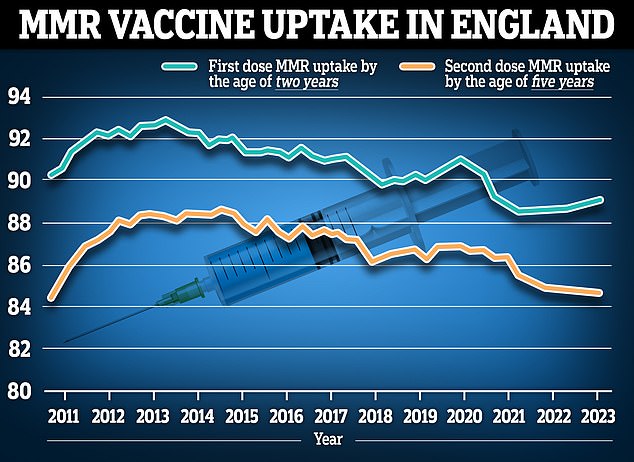
In England, 89.3 percent of two-year-olds received their first dose of the MMR vaccine in the year to March 2023 (blue line), compared to 89.2 percent the year before. Meanwhile, 88.7 percent of two-year-olds had both doses, up from 89 percent a year earlier
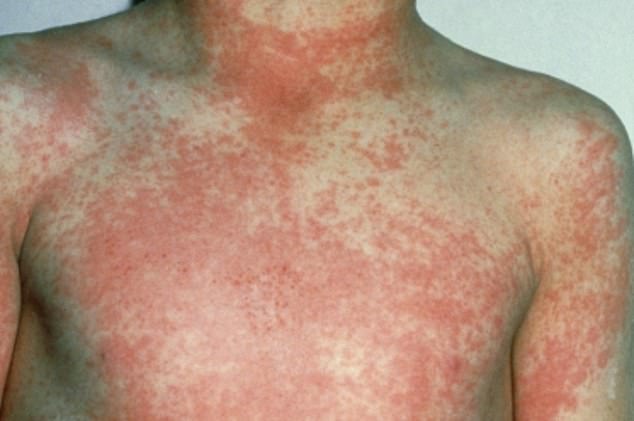
There have also been record cases of measles this year with 2,601 cases in England, the highest number since records began in 1996. By comparison, there were 362 laboratory-confirmed cases in 2023.
In contrast, cases of gout have also risen by almost 1,000 percent, according to NHS data.
Data obtained through the Freedom of Information laws shows that Liverpool University Hospitals NHS Foundation Trust recorded 5,864 cases of gout in 2023 – the most cases recorded by any NHS trust, and a 960 per cent increase on the figures in 2019.
The painful type of arthritis was traditionally known as ‘the disease of kings’ because it affected middle-aged men and was thought to be caused by excessive consumption of rich foods and alcohol, such as port.
Modern diets full of ultra-processed foods have increased the risk of people developing the condition, which is also linked to being overweight, as well as a side effect of certain medications, such as those designed to address high blood pressure.
Infectious diseases in children, including measles and whooping cough, have also seen their largest outbreaks in a generation this year.
Whooping cough first manifests in the same way as a cold, such as a runny nose, red and watery eyes and a sore throat with severe coughing, usually a week later.
While measles, which is also common in children, causes high fever, coughing, runny nose and rash all over the body.
Ten babies have died from whooping cough in England this year and there have been more than 12,000 cases, compared to just 856 last year.

Cases of the sexually transmitted disease syphilis, which was widespread in the 18th and 19th centuries, are at their highest level since the 1940s
Your browser does not support iframes.
There have also been record cases of measles this year, with 2,601 cases in England, the highest number since records began in 1996.
By comparison, in 2023 there were 362 laboratory-confirmed cases.
This is linked to a decline in MMR vaccination rates, with less than 85 per cent of five-year-olds in England fully protected.
The Department of Health’s public health grant to local authorities for preventive healthcare has fallen by 28 percent in real terms since 2015, The Times reported.
Chief Medical Officer Professor Sir Chris Whitty told MPs that there has been an increase in sexually transmitted infections (STDs) due to a decline in resources funding public health.
Cases of the sexually transmitted disease syphilis, which was widespread in the 18th and 19th centuries, are at their highest level since the 1940s.
The disease can cause life-threatening problems and complications in the heart, nerves and brain.
Government data shows that 12,588 new diagnoses of syphilis were made in sexual health services in England in 2023.
Between 2013 and 2019, diagnoses of infectious syphilis increased by 140 percent, from 3,345 cases to 8,040. After a temporary drop in diagnoses in 2020 and 2021, due to less testing during the Covid pandemic, diagnoses recovered in 2023 to 9,513.
The number of cases of gonorrhea is also at the highest level since records began in 1918, with 85,000 cases reported in England last year.
